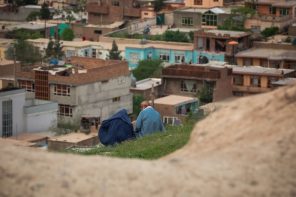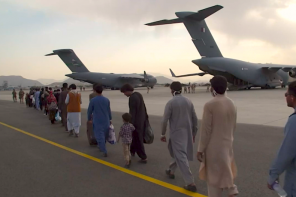I think of the words in a Tracy Chapman song: “If the moon were full I’d be howling inside; It only hurts, in matters of the heart.” I think of Shakespeare’s Juliet to her Romeo: “Swear not by the moon, the inconstant moon; That nightly changes in her circle orb. Less but thy love proves likewise variable.” And I think of the “big pizza pie” from the movie Moonstruck, with Cher and Nicholas Cage as the romantic pair.
I think of these all at 4 a.m. a good half hour before my alarm will go off with the adhan to announce the preparations for another fasting day this Ramadan. I think of all this because this glorious, glowing, full moon is shining on my head through the window over my bed. She does not announce love this time. Instead she says, “you are halfway there: halfway through the month of Ramadan!”
Let me tell you what happens around the halfway mark. The calendar starts to reverse. We no longer count the days into the month, but rather start looking towards the end of the month: 14 more days, 13 more days, 12 more days. The countdown continues until that glorious, glowing moon disappears into the hilal (slim crescent) and then goes black. But we won’t notice that she is black for one night, we will bask in the day light of consumption and celebration: ‘Id al-fitr: the festival of the fast breaking.
When my children were younger, this would be the time when they write their wish-lists: “the presents I want for ‘Id”. I would start my hunt for a selection of these, and for just-the-right outfits for holiday celebration. Last year, although my children are no longer small, I enjoyed a mom-comes-home-from-abroad version of this and shopped for new prayer rugs for each of them; new sarongs for the boys and extended family men; a fancy, Malaysian formal prayer outfit with songket skirt for my (then) only grandson; new prayer scarves for my daughters. I almost laugh when I think about it, because all this “Islamic paraphernalia” is marketed at this time, the same way Christmas stuff is marketed in the U.S.
I noticed a new charity box in the mosque last night advertising that the zakat-al-fitr would be ten dollars. The zakat al-fitr is the mandatory payment for each member of a family household if you have the means. It is about the equivalent of the cost of one full-course meal locally. I remember in Egypt that it was actually about 50 cents USD! In some places they still actually distribute it in food stuff — particularly rice, in Asia.
I, like some Muslims, like to pay this amount directly to a family or individual in need. Others like to pay to local institutions, which in the U.S. would be the mosques or Islamic centers. The mosques then distribute to the members of the community that they know are in need. It should be paid before the prayer on the day of the ‘Id, with two rationales: one is that those families in need would also like to celebrate the end of the month of fasting, with new clothes or gifts for the children, let alone a feast.
The other rationale stems from the origins of the word zakah, which is Z-K-Y, to purify, or make pure. This is the way the third pillar of Islam or zakah, or ritual charity or almsgiving, works. The idea behind it is clear: by paying this amount, those with the means purify the remainder of their wealth. This is an annual ritual most often organized around the same time as the end of the month or Ramadan. So people have to start figuring it out at this time.
The amount of zakah that should be paid is at a minimal rate of 2.5 percent on your unused wealth. But what is unused wealth? Suppose you have a savings that currently stands at 25,000 dollars. But from this time last year, it fluctuated up and down, never going below 10,000 dollars. Then you have to pay 250 dollars in zakah; that is 2.5 % of 10,000. This is because you actually used your wealth and anything over and above of what you used is an unused asset. That’s the simplest version of it.
It also includes other aspects of personal wealth, for those who have it, and so is not limited to savings. There are juristic differences in considering what is taxable to zakah from assets and what is not taxable. It is a lot more complicated than I have ever had to figure out: I’ve pretty much been limited to paying because of savings; or my family has been a recipient.
Keep in mind, that this is personal wealth, and not commodities of one’s ongoing business. For example, a car salesperson that deals in thousands of car sales annually might have no less than 100 cars at any one time, but that is not taxed. They say the rationale here is that Islam encourages investment. It is also about avoiding hoarding. Sorry, Mr. McDuck, you’d have to pay hefty just because you like to sit on your gold.
The Qur’an describes those who receive this amount: the traveler (which in our time is more like the refugee) those who are in need, widows, orphans, etc. I use the term needy because it is not a means for eradicating poverty. It is a way for the haves in a community to contribute towards the have nots. In fact, the way it is done should be clearly distinct from tithing in some Christian denominations. It is not your income that is taxed, but what you do not use. Plus, the poor do not pay, they are recipients.
For me, with regard to both the zakat-al-fitr and pillar zakah in general, I prefer to give directly to someone eligible. That means I have to know the circumstance of someone, in order to determine that it is appropriate for them to receive it. It’s a lot clearer than you might think given that there are many, many more poor people in the world than there are wealthy people. So it is not so hard.
I also do not limit myself to paying only to persons that I know well; I will give to a stranger in obvious circumstances. On the way to pray one day for ‘Id al-fitr in Cairo, the needy actually lined the streets, all the way to the prayer areas. This would not work very well for the distribution of the larger obligatory zakah, so in addition to figuring out how much, I also have to do my homework about where to give it. When I lived abroad, I knew people in my neighborhood, or the maid, the one who came three times a week in Indonesia and the one who lived-in were eligible.
I also give to non-Muslims if I know their circumstance. Whether we should give to non-Muslims is up for dispute by some jurists. But today’s realities make it quite clear: we can no longer consider the need of a Muslim as greater than the need of a non-Muslim. This is like the tendency in some international circles to consider the blood of non-Muslim combatants more important than Muslim civilians and combatants with the wars in Afghanistan and Iraq. We have a very different sense of the shared human community now, and we need to adjust accordingly.
This year, I face a dilemma because it seems the most pressing needs are actually in my own family. Some jurists say the zakah cannot be given to one’s own family. I think the rationale was appropriate for the extended family networks. If we give to our own family then we are really giving to ourselves, and that does not purify. But that only works when we truly live in these networks or truly see to their needs on a regular basis. If you know you cannot help them all year round, maybe this is one time when you can.
Also, unlike tithing the amount cannot go to the mosque, to build a mosque to pay for the imam or mosque leader. This is another kind of sadaqah, or gift-giving, distinct from zakah. You can give any amount you want at any time you want and to any number of causes, but to have this purification effect it must be under the prescribed terms. In Muslim majority settings there are elaborate offices and government ministries set up to help believers calculate the amount to be given, to collect the amount, and then to distribute it. They are often called bayt al-mal, even if not in an Arabic speaking context.
In the diasporic context there are supplications for these funds made by charitable organizations and various non-profits where one can pay, in addition to the community centers that collect and distribute. It’s hard to say who is qualified to advise about the correct calculations. So it is a matter of personal conscience. If you think about it, it seems a fairly simple trade off: with no particular virtue in being poor in Islam, you can have as much as you can earn decently. You can even enjoy the wealth as you see fit. If you want to drive a Mercedes instead of a Hyundai, then you can do that, and as a consequence have less to give in zakah. That’s the way the ruling works.
I was just reading in the Qur’anic passage about the ridiculousness of thinking one should give away all their wealth in order to make their circumstance the same as their servants, or as the poor. There is a virtue in wealth, in a manner of speaking, and that virtue is purified further by the opportunity to give. It is not sharing the wealth but giving a share of the wealth, and it’s a pretty small share… not ten percent of everything.
One of the many stupid things that happened as a result of 9/11 was that many of the Muslim charitable organizations in the US came under scrutiny. Any whose distributions crossed paths with those deemed enemies of the state, like Hamas, were accused of supporting terrorism. I say this is stupid not because of support for terrorism (however poorly defined) but because there was an interesting parallel in my life with the black power movement. The Black Panthers were gun-toting militants. They were also the original community organizers for free breakfast and lunch programs, and for after school programs or early educational programs for poor black kids. All of these have now been taken up by the government at large.
The idea of not supporting the building schools, health centers and providing for poor Palestinians because some of the organizations that do this are also accused of being terrorists would be like not paying taxes in America because you are a conscientious objector and we are at war in Iraq and Afghanistan.
We’d be seen as criminals and go to jail for tax evasion. It is slippery slope.




